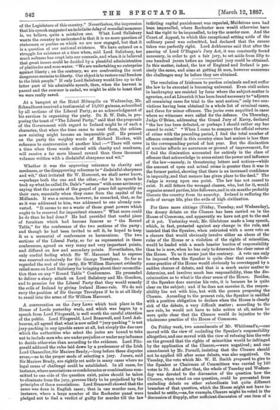A conversation on the Jury Laws which took place in
the House of Lords yesterday week, and which was began .by a speech from Lord Fitzgerald, is well worth the careful attention of the public. Lord Fitzgerald, Lord Bramwell, and Lord Ash. bonrne, all agreed that what is now called "jury-packing " is not jury-packing in any ignoble sense at all, but simply the due care which the authorities who select the juries are bound to take not to include men who are under prejudice or under any influence to decide otherwise than according to the evidence. Lord Fitz- gerald adduced the rules laid down by a predecessor of the Irish Lord Chancellor, Sir Maziere Brady,—long before these disputes arose,—as to the proper mode of selecting a jury. Jurors, said Sir Maziere Brady, are rightly set aside in many cases where no legal cause of challenge could be established. In all cases, for instance, where associations or confederacies or combinations com- mitted to one side of the question exist, pains should be taken to eliminate from the jury, persons likely to be prejudiced by the principles of these associations. Lord Bramwell showed that the same was done in English cases; that in one murder case, for instance, where a large number of the Rochester panel were pledged not to find a verdict of guilty for murder till the law inflicting capital punishment was repealed, Maidstone men had been impanelled, where Rochester men would otherwise have had the right to be impanelled, to try the murder case. And the Court of Appeal, to which this exceptional setting aside of the ordinary panel was submitted, had declared that the course taken was perfectly right. Lord Ashbourne said that after the passing of Lord O'Hagan's Jury Act, it was constantly found necessary, in order to get a fair jury, to set aside from fifty to one hundred jurors before an impartial jury could be obtained. In this matter, indeed, the law of England and Ireland is pre- cisely the same, and aims at getting fit men, however numerous the challenges may be before they are obtained.


































 Previous page
Previous page